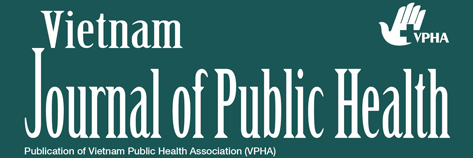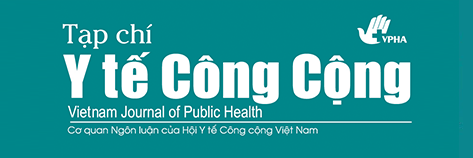Knowledge about HIV/AIDS, Among Health Workers in Three Provinces in Northern Vietnam: A Cross-Sectional Study
Abstract
Keywords
Full Text:
Download PDFReferences
WHO. Number of people (all ages) living with HIV 2015; Available from: http://www.who.int/gho/hiv/epidemic_status/cases_all_text/en/.
WHO, Handbook on Monitoring and Evaluation of Human Resources for Health 2009, World Health Organization, WB, USAID Geneva, Switzerland
Management Sciences for Health and WHO, Tools for planning and developing human resources for HIV/AIDS and other health services 2007, Management Sciences for Health: Cambridge Massachusetts.
WHO, Treat, Train and Retain Task Shifting: Global Recommendations and Guidelines 2007, WHO, PEPFAR, UNAIDS: Geneva, Switzerland.
Government of Vietnam, Vietnam AIDS response progress report 2014 March 2014, Socialist Republic of Vietnam. Hanoi
Government of Vietnam, The fourth country report on following up the implementation to the declaration of commitment on HIV and AIDS 2010: Hanoi
Li, L., et al., HIV-related stigma in health care settings: a survey of service providers in China. AIDS Patient Care and STDs, 2007. 21(10): p. 753-762.
Li, L., et al., Stigmatization and shame: consequences of caring for HIV/AIDS patients in China. AIDS Care, 2007. 19(2): p. 258-63.
Webber, G.C., Chinese health care providers' attitudes about HIV: a review. AIDS Care, 2007. 19(5): p. 685-691.
Hair, J.F., et al., Multivariate Data Analysis. 6th ed. 2005, New York: Prentice Hall.
Sarantakos, S., Social Research. 2nd ed. 1998: Macmillan Publishers.
Kline, P., Principles and Practices of Structural Equation Modeling. 2nd ed. 2005: The Guildford Press.
Somarriba, G., et al., The effects of aging, nutrition, and exercise during HIV infection Dovepress 2010. 14(3): p. 191-201.
Serrano, C., et al., Family nutritional support improves survival, immune restoration and adherence in HIV patients receiving ART in developing country Asia Pac J Clin Nutr, 2010. 19(1): p. 68-75
Raiten, D.J., Nutrition and pharmacology: General principles and implications for HIV Am J Clin Nutr 2011. 94.
Raiten, D.J., et al., Executive summary-Nutritional Care of HIV-Infected Adolescents and Adults, including Pregnant and Lactating Women: What Do We Know, What Can We Do, and Where Do We Go from Here. Am J Clin Nutr 2011. 94.
Musoke, P.M. and P. Fergusson, Severe malnutrition and metabolic complications of HIV-infected children in the antiretroviral era: clinical care and management in resource-limited settings. Am J Clin Nutr 2011. 94.
Green, K., et al., Integrating palliative care into HIV outpatient clinical settings: preliminary findings from an intervention study in Vietnam. J Pain Symptom Manage, 2010. 40(1): p. 31-4.
Alexander, C.S., et al., Palliative Care and Support for Persons with HIV/AIDS in 7 African Countries: Implementation Experience and Future Priorities. Am J Hosp Palliat Care, 2011.
Vellucci, R., Heterogeneity of chronic pain. Clin Drug Investig, 2012. 32 Suppl 1: p. 3-10.
Krakauer, E.L., N.T. Cham, and L.N. Khue, Vietnam's palliative care initiative: successes and challenges in the first five years. J Pain Symptom Manage, 2010. 40(1): p. 27-30.
Scholten, W.K. and B. Milani, Providing paediatric palliative care in Kenya. Lancet, 2010. 376(9757): p. 1988.
UNAIDS, Getting to Zero. 2011-2015 Strategy 2010, Geneva.
Haber, D.B., J.L. Roby, and L.D. High-George, Stigma by association: the effects of caring for HIV/AIDS patients in South Africa. Health Soc Care Community, 2011. 19(5): p. 541-9.
Earnshaw, V.A. and R. Chaudoir, From conceptualizing to measuring HIV stigma: A review of HIV stigma mechanism measures. AIDS Behav, 2009. 13: p. 1160-1177.
Government of Vietnam, Decision No. 36/2004/QD-TTG of March 17, 2004 approving the National Strategy on HIV/AIDS prevention and control in Vietnam till 2010 with a vision to 2020.
Government of Vietnam, Decision on approving National Strategy on HIV/AIDS prevention and control in Vietnam till 2020 with a vision to 2030. 2012.
UNESCO, Strategy for HIV/AIDS Prevention Education2004, Paris
UNESCO, Strategy for responding HIV and AIDS 2007, Paris
UNESCO, Strategy for HIV and AIDS 2011Paris
UNESCO. WHO, HIV and AIDS Treatment Education 2006, Paris
UNAIDS, HIV and AIDS Treatment Education 2006, Geneva.
Aggleton, P., E. Yankah, and M. Crewe, Education and HIV/AIDS-30 years on. AIDS Educ Prev. 23(6): p. 495-507.
Aggleton, P. and I. Warwick, Education and HIV/AIDS prevention among young people. AIDS Educ Prev, 2002. 14(3): p. 263-7.
Lutalo, I.M., G. Schneider, and M.R. Weaver, et al., Training needs assessment for clinicians at antiretroviral therapy clinics: evidence from a national survey in Uganda. Human Resources for Health, 2009. 7(76): p. 1-8.
Rasschaert, F., et al., Tackling health workforce shortages during antiretroviral treatment scale-up--experiences from Ethiopia and Malawi. J Acquir Immune Defic Syndr, 2011. 57 Suppl 2: p. S109-12.
Crisp, N., B. Gawanas, and I. Sharp, Training the health workforce: scaling up, saving lives. Lancet, 2008. 371(9613): p. 689-91.



